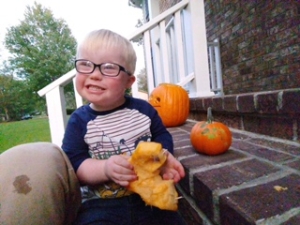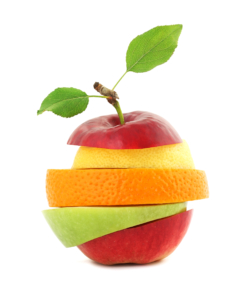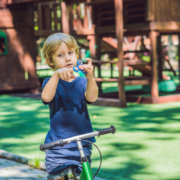Babies With Down Syndrome; A Parent Tells All
This post is for parents (and therapists) working with babies with Down Syndrome. Over the years I’ve worked with tons of babies with down syndrome and boy do they have my heart! I got together with an old family I used to work with and we talk all things down syndrome. In this post you will hear from a Mom that confesses it all and shares her most valuable advice and resources.

What is Down Syndrome?
Down Syndrome occurs when there is full or partial addition of the 21st chromosome, according to the Down Syndrome Diagnosis Network. Did you know that about one out of 800 babies are born with Down Syndrome in the United States?
Many parents to children with down syndrome admit they didn’t know much about Down Syndrome when they initially found out the diagnosis. Many parents also admit feeling lonely, scared, and unsure of what the future holds.
Down Syndrome can bring on certain challenges and medical complications. Some of the challenges they may face include but are not limited to the following:
- Physical difficulties
- Intellectual difficulties
- Speech and Language difficulties
- feeding and swallowing difficulties
- Sleep disturbances
- Health Concerns such as hearing/vision difficulties, respiratory infections, hypothyroidism, digestive issues, etc.
- Short stature
Although Down Syndrome can bring on certain developmental and medical challenges these babies are just like any other child. They are sweet, smart, caring, and so so loving. They can also be stubborn, feisty, strong willed, and independent just like most babies and toddlers, right?
Here is the sweetest video to future parents. Click HERE to watch and get your tissues ready!
Empathy
I wanted to write this article to help share a parent’s perspective with other parents, and even pediatric therapists. As a therapist myself I always try to put myself in other’s shoes, but as we all know you just never truly understand the feelings if you haven’t actually walked in the other person’s shoes.
I believe when we work on having empathy we are learning to understand that other’s experiences are different than ours. That their thoughts, feelings, and actions are different because their experiences have been different than ours. This is empathy, ya’ll! In my opinion, one of the best qualities of a good therapist is empathy.
When we have empathy towards a family of a child with any condition we are trying to understand the why behind the parent’s thoughts, feelings, and actions. We are then able to communicate more effectively, treat with compassion, and have more patience. HERE is an article I wrote a couple years ago about how I became a better therapist.
Below are questions I’ve often thought about asking many families. Some I’ve talked about with families and some I haven’t. Gini and Patrick are parents of Jude, a sweet little boy, I worked with a couple years ago. In this post, Gini shares all her feelings, advice, and some of her resources that have made a big impact on their life as a family.
Q. Thank you so much for helping me write this blog post, Gini. First, I’d like for you to tell us a few things about your family and a few of your favorite things about Jude.
A. We are a family of 4 with a small dog living in Charleston, SC. My husband and I moved here in 2012, got married in 2013, and had our first child, Jude, in 2015. In 2018 we were surprised with expecting a second child, Eva.
We didn’t expect that to happen as we had to undergo fertility treatments for Jude to be born. I’m a stay at home mom of the 2 children while Patrick works in construction project management.
A few favorite things about Jude is difficult to answer because it seems that every day there is something new. He LOVES to sing and dance and to watch him is pure joy. He also likes to act out the scenes of Disney movies as they are happening which is always fun to see.
Our most favorite thing is his smile and laugh which are contagious.
Q. When did you find out that Jude had Down Syndrome?
A. We found out Jude has Down Syndrome after he was born. He was born in a free standing birthing center and shortly after his birth the midwife said she suspected he could have DS.
They called a pediatrician who stated without testing she couldn’t say for sure but that in her opinion he did have it. A few days later that diagnosis was confirmed with genetic testing.
Q. In my experience working in early intervention I’ve seen Moms and Dads process emotions differently when finding out a new diagnosis.
How did you and your husband process this information together and individually?
A. Together we discussed what we knew about Down Syndrome which turns out was very little between us both. There was also a video that we came across (wild story on how) that we watched together.
The video had parents of children with DS talking about how it is commonly perceived as negative and then sharing how it is the polar opposite of the perception. We decided then we would share Jude with the world and not hide or pretend he didn’t have Down Syndrome.
I dove into researching resources and support groups. To me when something scares me, I want to know all about it and what to expect. I found this book very helpful. Patrick did some internet searching but found more comfort in reading a book by Gene Stallings about his son with Down Syndrome.
Q. Can you explain the emotions you had? Is there a moment that you remember feeling at peace after you found out?
A. There was a lot of fear due to both Patrick and myself having limited knowledge about Down Syndrome and the other diagnosis. We had a really hard time in the first days/weeks after his birth, everything was such a surprise.
There were also questions of, did we cause this, and how did this happen. Each day that we got a new diagnosis we felt more and more helpless.
I don’t think we really worried about Down Syndrome as much as Jude’s heart defect. Once his defect was repaired at 5 months old, I think then the reality set in that now we have different challenges with Down Syndrome.
Jude’s paternal grandfather is a doctor so we consulted with him often in the beginning. Shortly after getting Jude’s heart defect diagnosis, Patrick called his dad, upset, asking if Jude was going to live.
We’re blessed to have family that can give us reassurance from a medical standpoint.
Q. At the beginning I saw how much you juggled everything like superwoman and I still see how much you juggle between all of Jude’s appointments and your life at home.
Is there anything specific that helps you juggle it all?
A. I really just do what most mothers would do for their children. Patrick stepped up a lot and would help with the household things so that I could focus on Jude’s appointments, therapies, and errands.
In the beginning I would stress about the house having to be perfectly clean before any in-home therapies, I had to be showered, dressed, and Jude as well. I eventually realized that the therapist didn’t care about those things and therefore I slowly let those slide which lightened my stress.
Q. I’ve worked with hundreds of families over the years and a lot of kids with DS. I’m always surprised that some families are told to wait for speech therapy services to begin.
For you, you started early with Jude in speech therapy. Specifically for feeding concerns.
What advice can you give to parents who are on the fence between starting speech therapy early or waiting?
A. I think this is a personal decision for each family. I feel that early therapy is beneficial in that you start working with the child before bad habits are formed and you catch things earlier.
Children with Down Syndrome typically have low tone which affects everything including speech. Communication is a huge component to life so I wanted to make sure we started out on the right foot. My take on it was, it isn’t going to hurt to get the therapy so I will do it as long as I can.
We also wouldn’t have known about Jude’s silent aspiration if it hadn’t been for you. You suggested we have a swallow study which showed that Jude wasn’t safe to have thin liquids.
You then taught me/us what to watch for while he was eating and drinking to know if he was safe or not. Had we not started therapy early it may have taken a few rounds of illness to get to the underlying cause. There would have been risks in how that sickness affected his overall health.
What is Aspiration
Aspiration is when a food or liquid enters the airway. Food or liquids can enter and travel down the airway at different levels and occur with or without signs/symptoms. Silent aspiration is tricky for parents because the baby often does not cough or show other symptoms when aspirating.
However, there are signs/symptoms to look for during a feed that will help you better identify possible aspiration.
Signs/Symptoms of Aspiration
Watery eyes
Redness around eyes, forehead, and/or between the eyes
Runny nose
Discoloration around lips or face
Baby pulling away from breast or bottle
Baby consistently starts to feed and after first swallow cries or wants nothing to do with the feed after that
Baby seems uncomfortable before or during a feed
Baby turns head, cries, fusses, pushes bottle away with hand
Audible swallow (hearing a gulping sound when the baby swallows)
Faster rate of breathing
Faster heart rate
Baby/Child becomes congested during and/or after a feed
Baby moves around a lot and seems uncomfortable while feeding
Liquid spilling out of mouth
Coughing, choking, or wheezing
Pneumonia and/or recurrent pneumonia
Recurrent ear infections
For more information on aspiration check out this more in depth article HERE.
Q. I remember those early feeding days were so hard for Jude and for you. You were such a trooper. You never pressured or forced him to eat. You worked so hard on feeding and helping give Jude the best chance to succeed in feeding.
How did you feel when you found out Jude was silently aspirating? What helped you keep pushing forward without pressuring or forcing?
A. I don’t think I really felt anything. I didn’t understand the complexity of it and how potentially dangerous it was. There wasn’t an option on pushing forward…he needed to eat safely.
This would be another reason early intervention is so important because it was through you, as our feeding therapist that we discovered silent aspiration.
As a feeding therapist, I work very hard with parents to help them understand just how complex feeding is. Feeding is one of the most complex functions our body will do besides breathing. It’s important to remember babies will always choose to protect themselves over eating if eating is difficult. Safe breathing comes first, always.
It’s so important to identify the root cause to your child’s feeding difficulties and work closely with a feeding therapist from there. We MUST be responsive to our child’s feeding needs and their cues. They don’t have words yet so their behaviors are our cues to help us figure out what they are trying to tell us.
Pressuring and forcing a baby/child to eat will only create larger problems that will linger on into childhood. If we overlook our baby’s signals they are trying to show us that feeding is hard we can place them at higher risk for illness and more complex feeding difficulties as they grow.
Q. Let’s talk therapy in the home. You had a revolving door with therapists coming in and out. What was the best thing about therapy in the home and what was your least favorite part?
A. Therapy in home is convenient because there is no driving, the child is comfortable in their own environment, and the therapist can show us how to do things in our own home to work on certain skills.
My least favorite part was that my schedule was dictated by when someone showed up. If a therapist is late then it can throw your whole day’s schedule off. Of course as stated above in the beginning I would clean and pick up so much right before therapy because I felt the therapist shouldn’t see a dirty home.
Q. You received early intervention services through our state program, BabyNet. Can you tell us how you found out about this service? Also, tell us about the process to get services started.
A. I’m pretty sure that a social worker with the hospital told us about BabyNet and then the pediatrician also mentioned it at some of our first visits. The process, that I can remember, was an interview/assessment at an office.
After that the office contacted me with a list of Early Intervention companies to pick one. I contacted a couple companies from the list and once I picked one, then the worker came out for an evaluation and explained their services to us.
Q. I think you found me through one of the fb groups for DS. For your other therapy providers did you pick your own providers and if not, how did you find them?
A. I generally picked all my providers, gave the info to my Early Interventionist (EI) and she found out if we could get that person as a provider. I relied a lot on the local Down Syndrome Association recommendations.
Q. I want to talk about how you felt during therapy. Were there moments in therapy that you felt defeated and how did you move past those feelings?
A. There were definitely times that I felt defeated when we would work on a skill over and over and it didn’t seem any progress was being made. In those times I would see or ask other parents in the DS groups (that had kids similar to Jude’s age) that were also struggling with the same issues.
There would be other parents that would offer support and techniques that they had tried and had success with for these challenges.
Q. For some kids it takes a while to master a skill being worked on in therapy. There can be frustration and worry on the parent’s side. Then one day, on the child’s time, they have enough foundation skills to finally be able to master the new skill.
It’s such an exciting time to see your little one learning and growing. Tell us about a time that you celebrated Jude’s accomplishments in therapy? Do you remember a time when you and a therapist watched him master a skill you’d been working on?
A. I had always heard that children with DS won’t typically walk before age 2. Jude would work SO hard in physical therapy and when he took his first steps at 22 months old I was SOOOO excited. His therapist and I both were so happy. I remember celebrating like my favorite sports team had just won a big game.
Another accomplishment that I celebrated was when I was able to give him a juice box to drink without aspiration. I will never forget being in a truck stop Wendy’s and thinking, let’s just try this….and he did it. Safely drank juice from a juice box.
Q. For Jude, his ability to speak has been difficult and he continues to work so hard. We know babies with Down Syndrome have difficulty with sensory motor components and this makes speech difficult at times.
For other parents going through speech therapy and their child is having a difficult time with speech; what advice can you give them to keep pushing forward?
A. Don’t give up! I swear one day something happens and you see progress. It can be frustrating to know that your child is working so very hard but yet it doesn’t seem that anything is happening. Then one day they say a word or they start stringing a few words together.
Jude is still a LONG way from talking intelligibly (being able to understand what he’s saying) to those not familiar to him but he is at a point that I can say, use your words, and we can figure things out together.
HERE is an article on early intervention and speech therapy for kids.
Q. Can you tell us about some specific strategies that you have found helpful (for Jude) when working on speech?
A. Before he was saying any words we would use some sign language to communicate. Now he will try to use the sign but we make him attempt the words as well. We also try to make him say words, even if they don’t come out correctly. We also prompt him to use his words in most of our daily routines.
If we know he’s capable of a certain word then we’ll make him repeat until he gets it correct or is very close to correct.
How To Use Signs To Expand Expressive Language
Signs are a great tool to use to help babies/children learn vocabulary. You always want to say the word WITH the sign. It’s also a good idea to use hand over hand to help the baby/child imitate the sign. Putting a word with a gesture/sign helps the brain to learn this new word. d
Once the child is consistently using the sign, really start working on having them produce the word or even the first sound or syllable to that word. Tactile (touch) and visual cues are also helpful in teaching children to produce sounds/syllables/words especially child with Down Syndrome as they need that extra input to help feel and see what their muscles are doing. Once the word is learned and can be produced the sign fades away.
It’s important to remember that if your child could say a word they would but producing words is difficult for them. Therefore we want to make sure we know just how much to push and when to back off. This is when starting with signs is necessary because it gives them a way to communicate and start to learn how to communicate.
Watching for cues of frustration are important too. We don’t want our child to become so frustrated that they shut down. When trying to get our child to imitate a word, parents (and even sometimes therapists) can place so much pressure on a child to produce a sound/word that they shut down.
Of course, each parent knows the temperament of their child so finding a balance like Gini has is crucial for success and making communication fun!
Q. Tell us why Physical Therapy is so important for kids with DS?
A. Children with DS typically have low tone which can delay them learning to do gross motor activities such as rolling, crawling, walking etc. Physical therapy helps the child to learn the proper way to do these things so that they can continue to build their skills.
I never knew that a child that skips crawling actually skips an important developmental step. A physical therapist can make sure that things are done in a way that the child develops the correct skills at the right times.
I’m so happy Gini mentions how important these gross motor skills are for overall development. Children learn foundation skills first that will set the stage for higher level skills to be mastered.
Skipping certain skills such as crawling can lead to other areas of difficulty such as with eating, balance, crossing midline, walking, hand writing, attention, and so much more.
Q. Tell us why Occupational Therapy is so important for kids with DS?
A. Sensory issues can be a factor in children with DS. For Jude he has some sensory issues and demonstrates some sensory seeking behaviors. Behaviors such as spinning, jumping off things (couch, bed etc), swinging and rough play.
With OT we learn ways to help him to appropriately meet these needs with various techniques. The low tone affects the proprioception input (how a child’s body feels in it’s space).
While you and I need a light touch to get feedback, someone with DS may need a much heavier touch. This has affected Jude in that when he sees other children he hugs very hard.
This can come across as aggressive when it really isn’t. He needs to hug hard in order to get the appropriate feedback that his brain is telling him he needs.
Low tone affects your whole body and therefore things that we take for granted. Things like holding a fork, holding a pencil/crayon, zipping a zipper, or buttoning buttons can be difficult for children with low tone.
There is also the fact that shorter fingers, arms, and being overall shorter than the child’s peers make it more difficult to learn basic life skills. OT can help with accommodations/modifications to help the child become independent.
The sooner you start working on strengthening the muscles and giving the body muscle memory the better you will help organize their system for successful achievement of developmental milestones.
Q. What other types of therapy did you try with Jude and how did they help him?
A. Jude has participated in aquatic therapy in which he works with an occupational therapist in the water on skills. This helped him, as he LOVES water so it was a motivator. Also, with us living in an area with so much water around, we want Jude to be comfortable in and around it.
There have been times through Jude’s life that we had 4-6 therapy sessions a week and the change of environment helps keep him interested and able to enjoy the activities completed in therapy.
Q. Sleep disturbances can be common in children with DS, specifically because of the flatten nose bridge and other anatomical components.
Did Jude have difficulty sleeping? If so, how did you know he wasn’t sleeping well and what steps did you take to help him sleep better?
A. Jude did and continues to have problems sleeping, he still does not consistently sleep through the night at age 5 (I’m tired). Initially we didn’t think anything of it due to him being an infant, and well they don’t sleep well.
When he was really young the only way he would sleep is in a swing. We know that it goes back to that proprioception input and he needed that. I don’t remember when we did his first sleep study but we did it because it is common for children with DS to have sleep issues.
At that sleep study it was discovered he had mild sleep apnea so we continued to be followed by ENT and a sleep clinic. He eventually had a partial tonsil and adenoidectomy which resulted in no sleep apnea, this is great news but we still aren’t sleeping through the night.
What I’m learning is this is a common issue and there isn’t a one thing that causes it. We continue to try to find things to help him sleep better and so far there isn’t a magic trick. We’ve tried different supplements, increasing his iron levels, routines, etc.
We are about to embark on changes in his diet again to see if that will help. We went gluten free for about a month for a couple reasons and that didn’t help us.
Resources For Down Syndrome
Q. Let’s talk about some resources. You have done such a great job connecting with other parents, professionals, and organizations. Can you talk about some of these and what they have meant to you.
A. This is a BIG question. What I have found is the best thing in gaining resources is to keep your eyes and ears open. You never know when and where you will find a resource. I’m also not afraid to ask questions.
When I hear someone mention something interesting I will ask to learn more and most of the time the person will freely share all the info they have.
Down Syndrome Association of the Lowcountry
I have 2 resources that I rely on heavily, one is the local Down Syndrome Association/community, Down Syndrome Association of the Lowcountry. The local parents with children with DS are your best resource, get to know them.
Finding a parent that has a child a little older than your own is also a major help. They have just gone through what you are starting and can tell you their experiences. The key is to stay active. This doesn’t mean you have to go to every event or be involved In the online groups daily.
It means just reach out when you have a question about something going on, or need a therapist recommendation. Also, the online group is super helpful to just read what others are asking, this is how I find LOTS of resources.
Someone will ask something that won’t pertain to me at that time but I will just read it and then when I do need it, I can come back and read again or ask that individual questions.
Down Syndrome Diagnosis Network
The other resource is an organization called Down Syndrome Diagnosis Network which is an online support group of families from all over the WORLD. You are put into subgroups for things that pertain to your child, such as sleep issues, heart issues, age group, etc.
I just read in those groups. This is how I found the specific speech therapy technique, vital stim therapy, for silent aspiration. Once I saw that this was successful for some other families, I started researching it. We had tried so many other things and I really needed to see some progress.
I found out it isn’t offered in our area. We were fortunate enough that I was able to travel with Jude to get this therapy, which was successful for him. I would have never heard of it had I not been in a group with families from other parts of the world.
Q. Please tell us how you found groups/professionals/organizations for babies with Down Syndrome.
A. The midwife from the birth center that Jude was born at gave me a sticky note with the DSAL website on it. I then went there and filled out the new parent info. At least this is how I think I found the local community. It was all a real blur at the time so I don’t remember all of the details.
I found the DSDN group when someone locally posted about a retreat they had for the mothers of children with DS. I looked into it and knew that I wanted to be part of a community where they got together to learn about new things and have support with one another.
What I didn’t know at that time was that it would also provide me with a weekend each year as a respite and time to recharge my own batteries. It is within the DSDN community where I have found countless other resources.
Q. How has having a baby with Down Syndrome impacted you as a person?
A. I’m not entirely sure of this answer because Jude was our first child, so I’m not sure how much of my life was impacted by just being a new parent and how much was impacted by that child also having DS.
I will say that I’m not sure how I would have connected to our community had I not had a built-in support system in the DS community. We didn’t do playdates and typical things as a new parent. We were busy with doctor appointments and therapy.
I think as a person Jude has impacted my life by making me appreciate the small things more. He works so hard to reach typical milestones so we celebrate BIG when he does them.
This is something I’m sure we would have documented had he not had DS but since he puts so much work in, it’s a big deal. This means that I don’t take those things for granted.
He has softened my heart in some ways of giving grace to others. He has also made me stronger in that there are times I have to advocate for him fiercely. So I would say that I’m a stronger advocate not only for him but myself and family as a whole.
Q. How have you and your husband planned for the future for Jude?
A. This is a conversation that we have often and I hate to say it but we haven’t taken any action steps at this point. I will say that all the therapy sessions and advocating at school for inclusion is so that Jude will grow up with the ability to live as independently as possible and able to advocate for himself.
We do plan to do things such as set up a special-needs trust, and ensure that we have a will that will easily be executed. I have a binder called Jude’s Journey book. It is semi-updated with all his medical, education, and necessary information so that in the event something happens to us or we have to emergently leave the home we take it with us.
This binder will enable us or anyone else to see at a glance what Jude has going on that needs to be addressed. We have discussed with family in the untimely event that we can’t care for Jude who can and is willing to care for him.
We had to think about overall the extra “stuff” that is involved in his care and who can and will be able to meet those needs.
Q. As Mamas we all have some pretty crappy days. On your hardest days, how do you cope to get through them?
A. How true this is!! Hard days mean venting to my husband, a friend, or to the DS community. Sometimes the hard days are just because life is sometimes unbearably hard. Other days it’s because of a challenge(s) that DS is bringing forth.
Most of the time just venting is all it takes for you to just release the emotion and then pick yourself up and move on. If I were to give any advice to a new parent of a child with DS it is that you will feel ALL kinds of emotions and every single one of them is OKAY. You just have to give yourself a minute to feel the emotion and then move forward.
Tomorrow is a new day…and sometimes bedtime can’t come soon enough. Right?!?
Q. What’s been your biggest blessing throughout all this?
A. Jude is the biggest blessing. He is funny, smart, and overall a happy kid (not all the time though). He doesn’t really know a stranger and to watch him interact with “strangers” will melt your heart most of the time.
He’s also led my path to meet some of the most incredible friends that I will ever have. These are friends that “get it” and I can say anything to and they don’t judge.
Q. If you could say anything to other parents in your shoes what would it be?
A. There will be days that are HARD and you wonder how you are going to deal with whatever is going on, but you will do great. It amazes me at just how the journey is. You will feel like the weight of the world is on your shoulders and then your child will do something that makes everything disappear and your heart happy.
Lean on your supports because when I say the DS community is strong, I can’t stress that enough. I have cried tears of joy watching children I don’t know learn to walk or talk and I’ve mourned with families that I have also never met.
The bond is really unspeakable for me, we are all so very different but yet we somehow come together.
Q. If you could say anything to other parents that haven’t walked in your shoes what would it be?
A. Show grace and kindness to all, you have no idea what or where in a journey someone is. Don’t be afraid to ask questions. I appreciate when someone asks questions versus stares and whispers.
I also notice when others talk to Jude like he is a typical 5 year old boy, and while he may not be able to respond to you, he understands what you are saying. This makes my mama heart so happy, you aren’t assuming incompetence.
Q. Lastly, tell us something (or several things) you want others to know about Jude.
A. Jude is like most other typical 5-year-old boys. He likes to play, swing, sing, dance, Disney movies, fight with his sister, and ignore what mom and dad say. We don’t allow him to misbehave without consequences.
He is treated the same as his typically developing sister. He has some extra challenges along the way but we deal with them the best that we can.
I foresee Jude doing big things in the future and I can’t wait to watch all his personality and interest develop as he grows.
To all parents: The days will be hard. Some days will be difficult. Some days will seem impossible. But..Some days you will feel like you got this. Like you are doing a good job. Some days you will have tears and like Gini said bedtime can’t come soon enough. But…Some days you will have tears of joy and so so much love. You’re doing a good job!
You may also like:
This blog uses affiliate links. There is no cost to you to use the links. Affiliate links are used to help keep this blog up and running for you.













Leave a Reply
Want to join the discussion?Feel free to contribute!